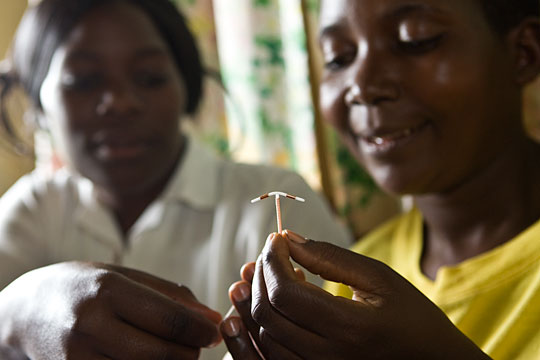As unemployment remains high and the region’s resources are rapidly being swallowed up by the booming population, family planning is something that every family should consider here in East Africa. In Amuria, Uganda where I live, 57% of all people are under the age of 17. When one compares that to my home town of Richmond, Virginia, in the US, that number falls to 22%. Uganda’s youthful population of 32 million has nearly doubled in the past twenty years. It has one of the highest growth rates in the world. If the current trends stay on track, the country will be home to more than more than 130 million people by 2050.
I’ve recently been working with PSI, Population Services International, in Tanzania and Uganda. PSI works in a number of areas in Global Health, but I’ve been specifically documenting their family planning services here in East Africa. Working in both rural and urban areas of East Africa, PSI educates women and families about family planning and provides them with birth control solutions such as condoms, IUDs, and oral contraceptives. According to the organization, PSI prevented an estimated 3.5 million unintended pregnancies and over 17,000 maternal deaths in 2009 alone. Fewer pregnancies and spaced births provide families with a more sustainable way of life, and further boost the chances of survival for existing children. Above, women visit a family planning clinic in Dar es Salaam, Tanzania.
Most Ugandan women average seven children in their lifetimes. Here large families are needed to work the land, but the number of children a family has also determines that family’s, and larger clan’s, social hierarchy, especially in rural areas. However, when children reach adulthood they often find themselves in deeper poverty than their parents because their parent’s land must be divided among such a large number of children. Families who have large numbers of children in turn find it a struggle to come up with enough money to educate them all. Often families must choose which children to send to school and which ones to keep at home. When parents do choose education for their child, it is often in overcrowded classrooms, averaging about 70 students per teacher in Uganda. In my district this number reaches 120 students per teacher. Above, children learn in a crowded classroom in Tororo, Uganda.
Above, Sylvia Mkuteni (name changed) is twenty-five years old and lives in Masaka, in southwestern Uganda. Her husband lives and works in Kampala and only comes home once every few months. She has a hard enough time raising their five children on her own, and so, despite her husband’s wishes for a larger family, she’s decided not to have more children. Three months ago she received an IUD through PSI’s services. She hasn’t told her husband about it and doesn’t plan to.
While access to contraception in Africa is widely available in most cities, those in rural areas may be a day’s journey from any family planning services. In East Africa, PSI works to make their products and services available to all by establishing programs in small private clinics in both urban and remote, rural areas. Often women first hear about their option to plan families through PSI’s informational adverts on the radio.
While most women can pay for their contraception, PSI has designated one day a month in Masaka as a discount day, where women can receive services at a highly discounted rate. They’ve been extremely successful at stamping out common misconceptions about contraception that are whispered between women in the village: contraception makes you sterile, contraception causes abnormalities in future offspring, breast milk decreases during use, etc.
Above, Bashir Hassan (left) sells Salama brand condoms in his general store in Dar es Salaam. PSI is the manufacturer of these the most popular and widely available brand of condoms in the country.
Despite the large presence of the Roman Catholic Church (42% of Ugandans are Catholic), the nuns and clergy here are quietly supportive of family planning operations, directing parishioners to where they can receive such services or even handing out condoms. Above, Sylvia Mkuteni (right) examines an IUD at Kawoko Muslim Health Centre in Masaka District, Uganda.
PSI has programs in over 65 countries throughout the world. Reproductive Health is just one of the areas in which the organization works. Others include malaria and TB prevention, HIV/AIDS and water treatment. If you’ve ever wondered how many residents we have on our planet and at what point humans will outgrow the earth’s resources, this recent David Attenborough/BBC documentary suggest that things may get pretty tough within the next forty years. As the average American consumes as much of the world’s resources as 300 Tanzanians, it’s a topic in which we have a vested interest. Take a look. It’s thoroughly interesting. Take a look.









